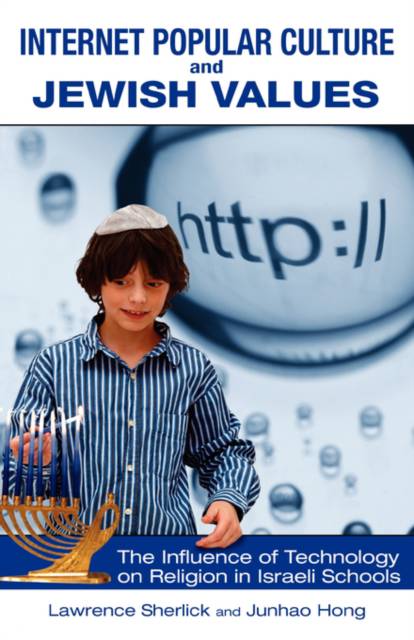
- Afhalen na 1 uur in een winkel met voorraad
- Gratis thuislevering in België vanaf € 30
- Ruim aanbod met 7 miljoen producten
- Afhalen na 1 uur in een winkel met voorraad
- Gratis thuislevering in België vanaf € 30
- Ruim aanbod met 7 miljoen producten
Zoeken
Internet Popular Culture and Jewish Values
The Influence of Technology on Religion in Israeli Schools
Lawrence H Sherlick, Junhao Hong
Hardcover | Engels
€ 111,95
+ 223 punten
Omschrijving
Are the values of students and their teachers threatened each time they enter the unchartered waters of the Internet's popular culture content? The Internet has indeed "come of age," and as was the case with traditional mass media, the Internet has been increasingly examined for its positive and negative effects, particularly on children. What triggered the present study was a newspaper article that described a ban on computers and the Internet imposed in October 1999 on its followers by the Belz Hasidic, an Israeli Ultra-Orthodox (or Haredi) religious sect. This edict was also endorsed by 30 leading Ultra-Orthodox rabbis from various other religious communities in Israel. Explaining that this original prohibition against computers and the Internet was later revised to permit computer use but continue the ban on Internet access, the article noted, the Belz Hasidic sect determined that, "computers have proved valuable in teaching the Bible and in running businesses". The Internet, however, was declared "out of bounds", largely because the information it exposed conflicted with Ultra-Orthodox principles rejecting modernity, popular culture and especially "its proliferation of links to pornographic sites". This study examines the convergence of religion, elementary education, Internet technology, and popular culture messages within Jewish elementary school classrooms in Israel. This research examines the methods used by Israeli computer coordinators to manage the convergence of Jewish (or humanistic) values with potentially conflicting Internet generated popular culture messages. It asks what values, whether Jewish values or human values at the core of the Jewish educator's belief system are important to transmit to their students? It questions what types of popular culture messages carried by the Internet conflict with these values? More importantly, this study surveys how educators and students evaluate these conflicting messages in relation to the values they hold, and the manner in which these conflicts are managed. This is an important book for those in communication, education, Jewish studies, and sociology of religion.
Specificaties
Betrokkenen
- Auteur(s):
- Uitgeverij:
Inhoud
- Aantal bladzijden:
- 220
- Taal:
- Engels
Eigenschappen
- Productcode (EAN):
- 9781934043967
- Verschijningsdatum:
- 28/05/2008
- Uitvoering:
- Hardcover
- Formaat:
- Genaaid
- Afmetingen:
- 140 mm x 216 mm
- Gewicht:
- 426 g

Alleen bij Standaard Boekhandel
+ 223 punten op je klantenkaart van Standaard Boekhandel
Beoordelingen
We publiceren alleen reviews die voldoen aan de voorwaarden voor reviews. Bekijk onze voorwaarden voor reviews.











